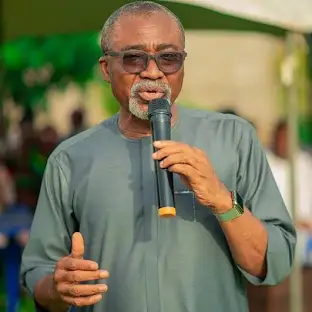Senator Enyinnaya Abaribe, representing Abia South in the Nigerian Senate, has expressed his belief that the country would have been in a better position had Peter Obi, the Labour Party candidate in the 2023 presidential election, emerged victorious.
Speaking during an interview on Channels Television’s Politics Today on Monday, Abaribe discussed the challenges faced by Nigeria under the current administration of President Bola Tinubu.
He argued that Obi’s leadership style would have been markedly different, particularly in addressing issues of fairness and equity.
“If Peter Obi had won, you probably would have seen a better Nigeria than what we are seeing today,” Abaribe stated.
Abaribe, a vocal critic of the current administration, pointed out what he referred to as a growing culture of nepotism under Tinubu’s government.
He stressed that Obi’s presidency would have avoided the deep-rooted favoritism that Abaribe believes has worsened since the tenure of former President Muhammadu Buhari.
“Number one, he would not be as nepotistic as this government, he won’t, it’s not in him. That is just who we are, we feel for the other people,” Abaribe said.
The senator highlighted what he saw as a glaring example of favoritism in Tinubu’s government: the appointment of four ministers from Ogun State, while many other states had only one representative in the cabinet.
Abaribe accused the president of repeating the mistakes of his predecessor, former President Buhari, but exacerbating them.
“Buhari towed the path of nepotism, but it deepened under President Tinubu because Buhari did it and nobody said much except him,” he remarked.
Abaribe’s criticisms are rooted in his long-standing concerns about equity in Nigerian governance, especially when it comes to the allocation of resources and positions of power. He expressed a belief that under Peter Obi, such disparities would have been addressed more fairly.
But the senator did not only focus on the presidency. He also spoke on the broader challenges faced by the South-East region, particularly in terms of its political marginalization.
Abaribe called on the people of the South-East to focus on their own development rather than relying on federal leadership to treat them fairly.
“We should prioritize self-development and not wait for the federal government to deliver on fairness,” he said.
He also lamented that apart from former Presidents Olusegun Obasanjo and Goodluck Jonathan, no other Nigerian president has treated the South-East equitably.
Abaribe urged the South-East to take the reins of its own future and work together to build a better, more cohesive region.
“Let us go back to the South-East and revamp it, make it more livable, better, and more cohesive, and hold ourselves together,” he added.
His call for self-reliance is a direct response to the frustrations felt by many in the region, who feel left behind in the national political landscape.
Abaribe’s comments are part of a larger discourse on the growing sense of political disillusionment in Nigeria, where many citizens, especially in regions like the South-East, believe that successive governments have failed to address their needs.
The senator’s remarks about Peter Obi, however, are not entirely surprising. Abaribe was a vocal supporter of Obi during the 2023 presidential election, and he has consistently praised the Labour Party candidate for his stance on national unity and equitable governance.
Despite the criticism of Tinubu’s administration, Abaribe’s comments also reflect broader concerns about the future of Nigerian politics. He urged Nigerians to hold their leaders accountable and focus on building a nation where fairness and equity are not just ideals but realities.
While Abaribe’s words paint a picture of a better future under Obi’s leadership, they also highlight the deep divides within Nigeria’s political landscape. There are those who continue to hope for a different Nigeria—one led by leaders who place national unity above personal interests.
Abaribe’s statements come at a time when the country is grappling with numerous challenges, including high inflation, rising insecurity, and a volatile political environment.
In this context, the senator’s criticism of Tinubu’s leadership seems to resonate with many Nigerians who are dissatisfied with the current state of the nation.

